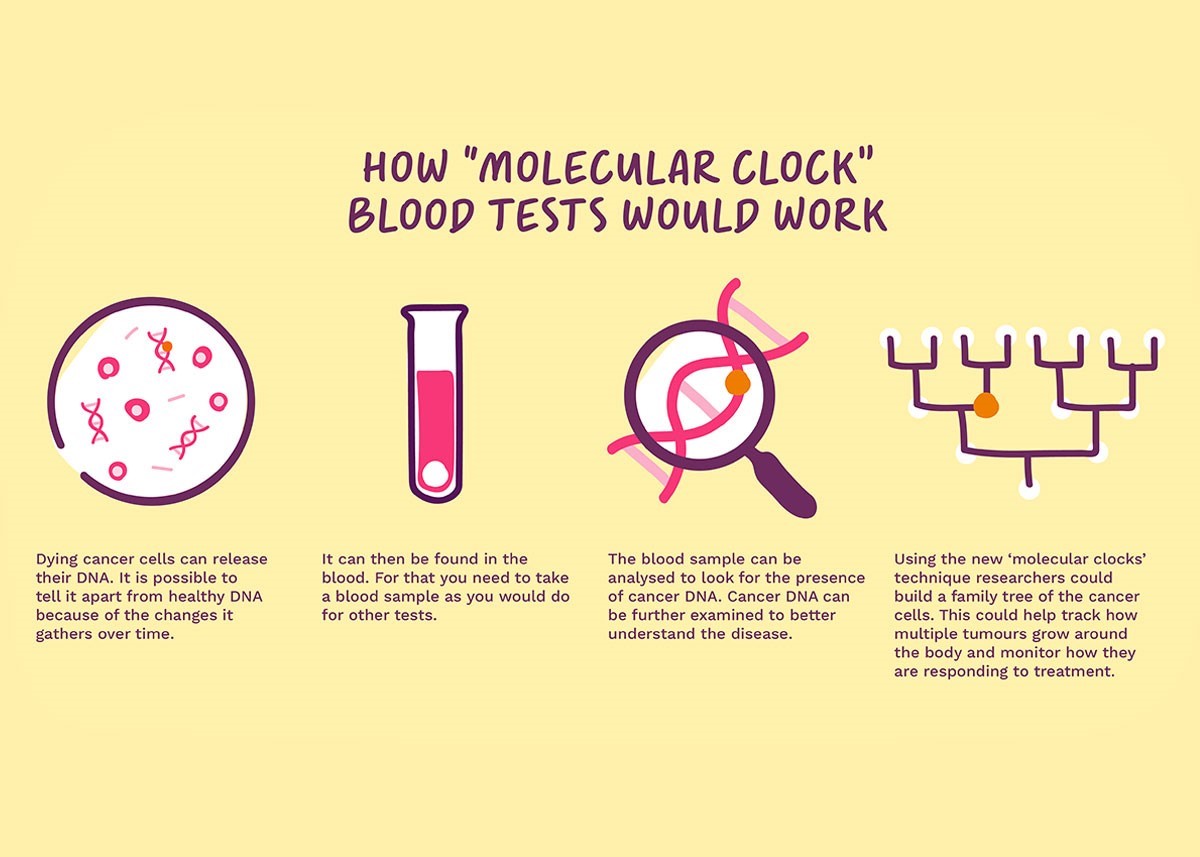Researchers have developed a ‘molecular clock’ blood test that can track the growth of multiple tumours around the body to help identify the most actively growing tumours and guide treatment.
Researchers have developed a ‘molecular clock’ blood test that can track the growth of multiple tumours around the body to help identify the most actively growing tumours and guide treatment.
A new blood test for secondary breast cancer
Research, funded by Breast Cancer Now and others, has led to a new blood test for secondary (metastatic) breast cancer. It could help track the growth of multiple tumours around the body and work out how well they are responding to treatment.
Scientists believe that this new test would be highly sensitive and relatively cheap to perform, as it doesn’t require any previous knowledge of the genetic make-up of a patient’s cancer. But it needs to be developed further before it can reach clinics.
This test has been developed based on new results from the Breast Cancer Now LEGACY Study, looking at secondary tumours which were donated by women with breast cancer following their deaths.
How the ‘molecular clock’ test works
The new test measures cancer DNA in the blood that has come from multiple tumours around the body. It could help identify the most actively growing tumours that may be more likely to spread to new organs, allowing doctors to adjust treatment.
The test relies on tracking ‘molecular clocks’ of cancer cells. Over time cells that grow and multiply gather molecular marks on their DNA, which appear in distinct patterns. These patterns can help distinguish new cancer cells from older ones, indicating which tumours are growing.
Professor Andrea Sottoriva from The Institute of Cancer Research, whose team developed the blood test, said:
‘We identified a brand new way of understanding how the tumour grows and evolves, through analysing ‘molecular clock’ signatures from cancer DNA in the blood.’

When breast cancer spreads to another part of the body such as the bones, liver, lung or brain, it is called secondary, or metastatic, breast cancer and is incurable. The blood test could be used to track how secondary tumours change over time, and to monitor their response to a range of treatments, including chemotherapy, immunotherapy or targeted therapies, as well as radiotherapy.
With further development, researchers hope that the molecular clock blood test could be used to earlier detect breast cancer coming back and spreading, making it easier to treat.
The LEGACY study
New results from the Breast Cancer Now LEGACY study have helped to develop this blood test.
In the LEGACY study, researchers led by Peter Barry at The Royal Marsden, examined all secondary tumours from two women with breast cancer who donated samples to research shortly after their death.
They found that the spread of breast cancer follows a traceable, orderly sequence. Cancer cells forming majority of tumours around the body could all be traced back to one cell in the original tumour in the breast.
Dr Simon Vincent, Director of Research, Support and Influencing at Breast Cancer Now, added:
‘Studying how and why breast cancer spreads through the body is vital if we are going to find a way to stop it. This innovative study, made possible thanks to the patients’ selfless donations, helps us gain insight into how breast cancer spreads from one part of the body to another, paving the way for further research to stop secondary breast cancer.’
Scientists believe that tracking secondary breast cancer is more achievable than previously thought if this traceable way is the main way breast cancer spreads.
Next steps
Peter Barry, who led the LEGACY study, said:
‘This was a wonderful result of collaboration with a highly innovative team in the ICR led by Professor Sottoriva. It points the way to potentially sample one active metastatic site in a patient and then using the molecular clock signature with regular blood tests, test and monitor new treatments in real-time.’
But some cancer cells can develop defects in the way they add molecular marks to their DNA and no molecular clock records are left, so further research is needed to understand who may benefit most from this test.
‘Clearly we need to expand this testing to a larger cohort of patients to see how widely applicable it might just be – in breast cancer patients as well as potentially in patients with other cancer types,’ added Peter.
The study was published in journal Nature Communications.
If you are concerned about breast cancer spreading or have any questions about secondary breast cancer you can call our free Helpline on 0808 800 6000 or use our Ask Our Nurses email service.